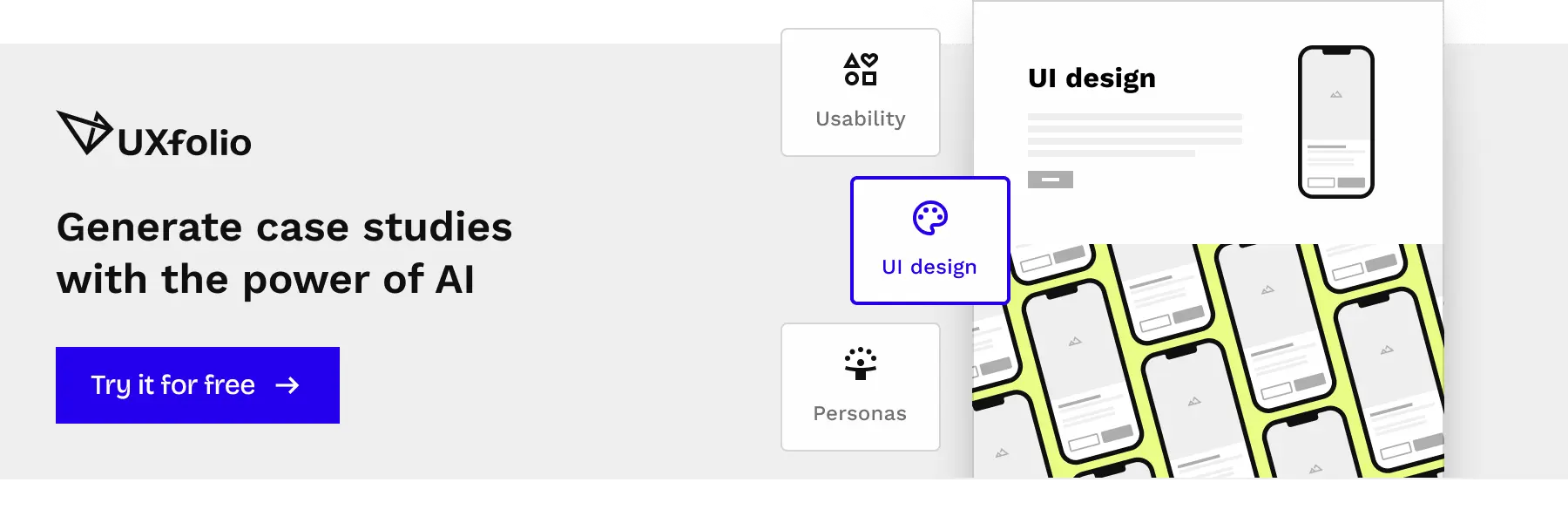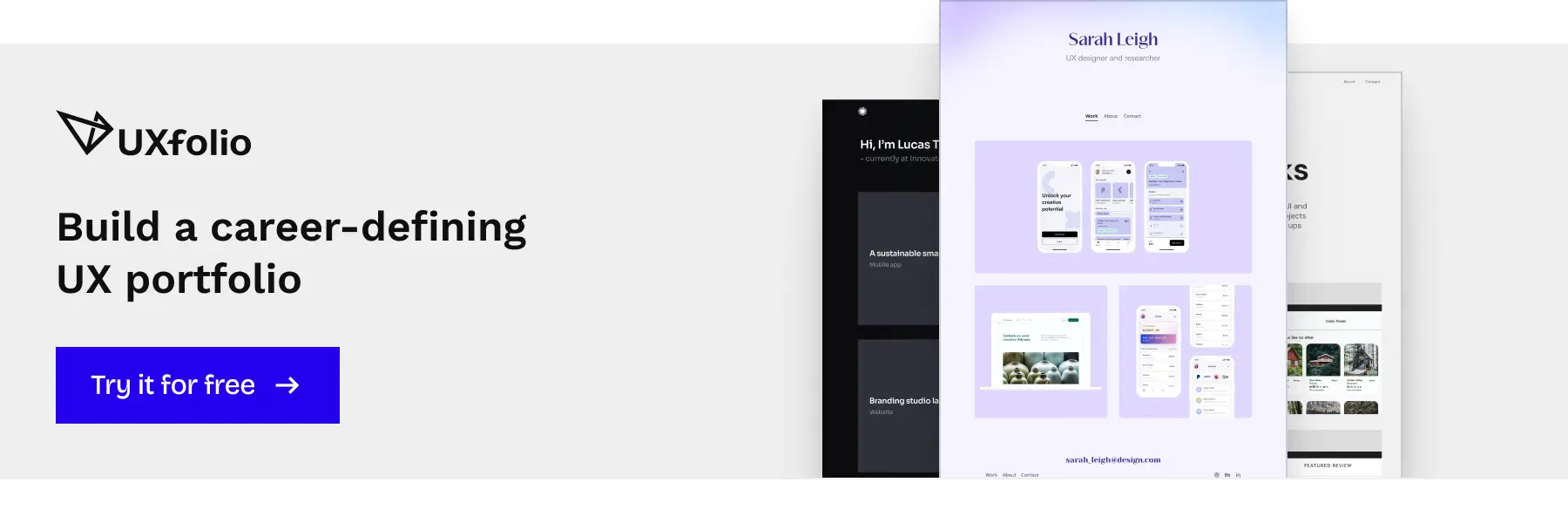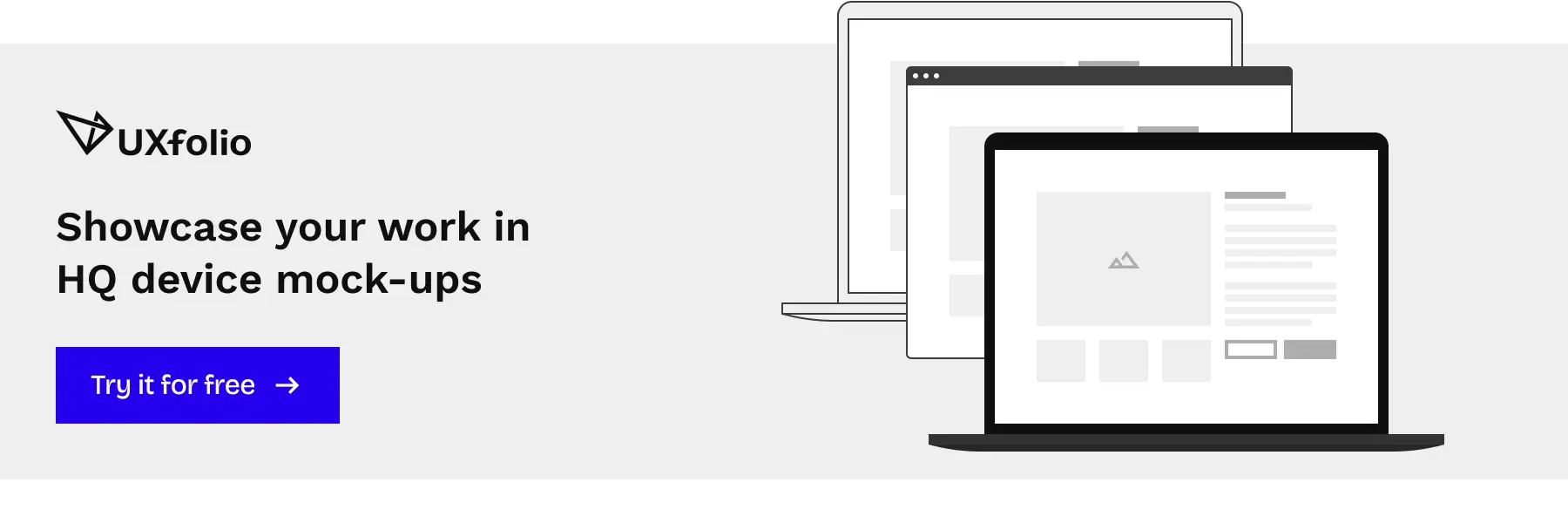If your resumé, portfolio, and case studies are on point, landing a job interview will be a breeze. The next step is preparation, so you can present yourself and your work with the necessary confidence. And confidence is key.
Every interview is different, and a lot depends on elements that are out of your control. But, attending an interview knowing that you are well-prepared will alleviate a great deal of stress and it’ll help you deal with anything unexpected.
The good news is that your preparation started when you put together your UX portfolio. If you put the effort into your case studies, you will find it much easier to answer UX designer interview questions in any of these categories:
- General UX related questions
- Career related questions
- UX design process related questions
- Questions about inspiration and motivation
- Product management & collaboration related questions
- Skill and toolset related questions
- Your knowledge of the company or product
1. General UX designer interview questions
The majority of UX designer interviews start with the assessment of your general knowledge about UX. The purpose of such a section is simple: the employer wants to make sure that you know your UX facts.
It doesn’t matter whether you are a junior or senior UX designer, having a solid base-knowledge is crucial. Therefore, if you cannot define UX or your responsibilities as a UXer in a clear and concise manner, you need to gather your thoughts before the interview.
Questions:
- What is your definition of UX design?
- How does UX differ from other design disciplines, such as UI design?
- Describe the value of UX design!
- What do you think will be the next trend in UX design?
- What is the meaning of the term design-thinking?
- What defines a good UX designer?
- What are the 3 most important skills of a UX Designer?
👉 Pro tip: Instead of giving textbook answers – as most junior candidates do – try to come up with your own definitions. Of course, you can seek inspiration in articles or books, but make sure to add your own flair to show your personality and a willingness to think for yourself.
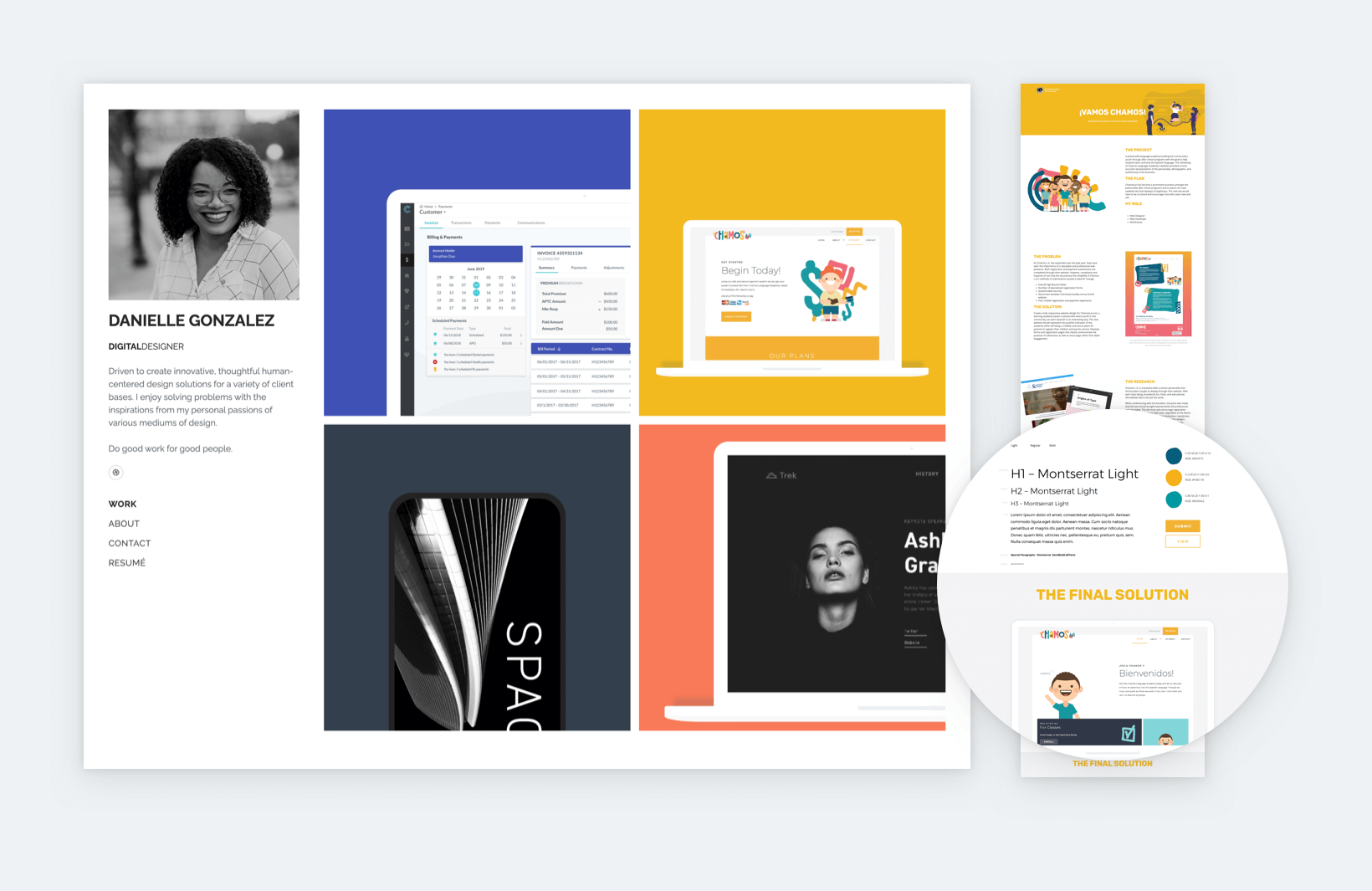
2. Career-related interview questions
The general section is the shortest part of most job interviews. What’s more, if you answer a few of the initial questions in a professional way, it will be even shorter. The career-related part could be already considered the “body” of the interview, where you’ll prove that you are capable of translating theory to action. (Some of these are specifically senior UX designer interview questions.)
Questions:
- Why did you choose UX Design as your career?
- How did you become a UX Designer? Did you study UX, or did you convert from another discipline?
- Tell us about your most successful project!
- Tell us about the project that makes you the proudest!
- What was your favorite project that you’ve ever worked on?
- Tell us about a UX project that didn’t go as planned. How did you manage it?
- Where do you see yourself in 5 years?
- What are some of the biggest challenges you have faced/are facing as a UX designer?
If you are a junior UX designer, you might have realized that you don’t have instant answers to some of the questions. No problem! If you are applying for junior positions you can always talk about your passion projects or the projects you’ve done in a bootcamp. It doesn’t matter that the project wasn’t shipped. What matters is that you have answers.
👉 Pro tip: Use examples whenever possible! They just make everything feel more real and impressive. For this purpose, your best weapon is your UX designer portfolio with your case studies. Be ready to pop out your tablet or computer, so you can demonstrate everything that you are talking about.
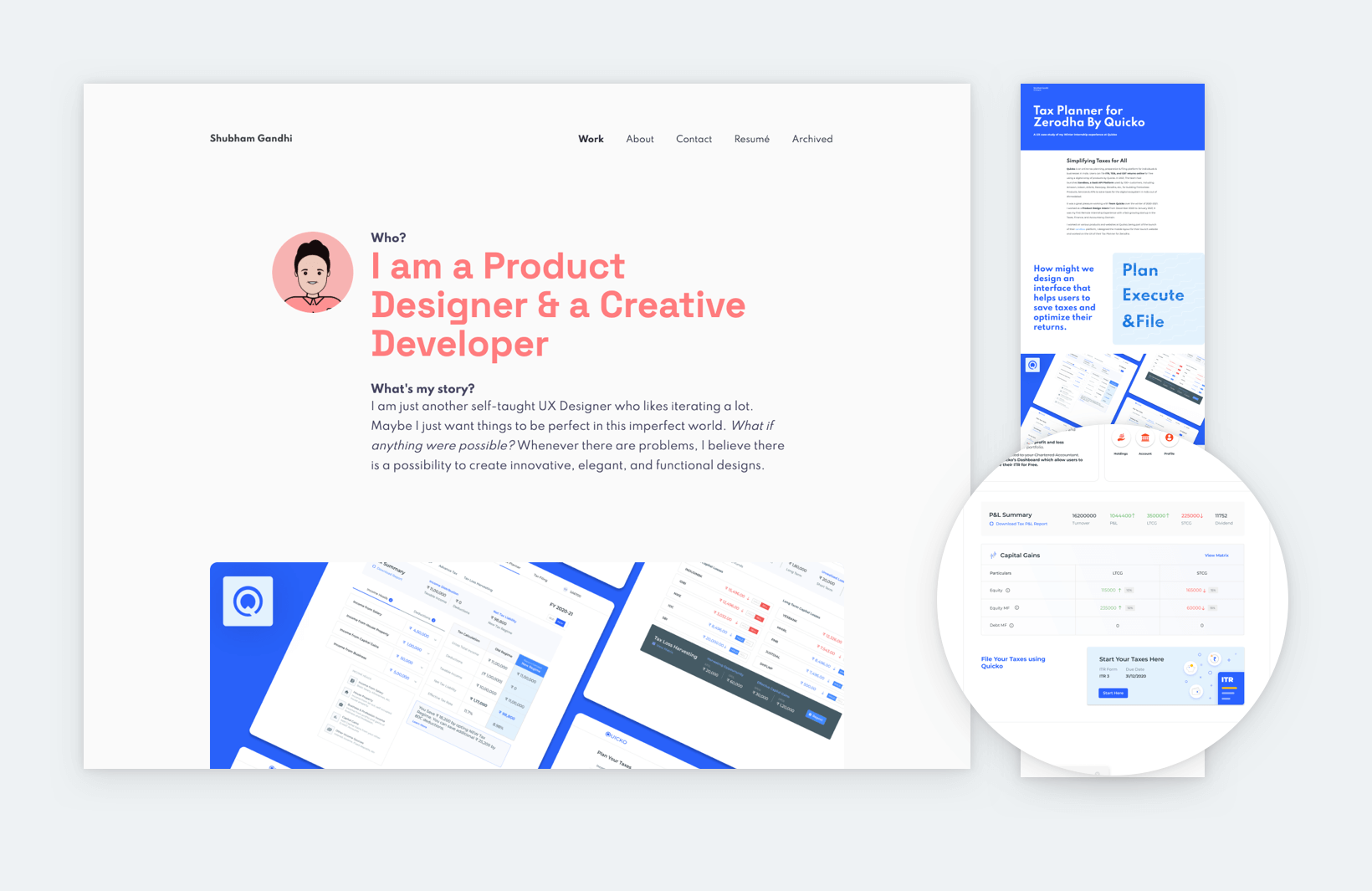
3. UX design process-related interview questions
Most UX designers have their own process and their very own reasons for preferring that process. Again, some of the questions – about your methodology – are best answered with the aid of your case studies.
Don’t be shy! If you are not asked to show your process through a portfolio, take the leap and offer to present your process and methodology through actual case studies. It’ll prove that you’re not afraid to take the necessary steps to help your cause.
Questions:
- Talk us through your design process!
- List and describe the design methods that you use!
- With the use of a case study from your portfolio, walk us through your process and methods in use!
- Show us your portfolio!
- How do you make feature-related decisions?
- Can you share some experience dealing with research and usability testing?
- Show us a design example that solved a business problem.
- Do you practice universal design? How do you make a product accessible to users with disabilities?
👉 Pro tip: You have two options here. First, to present a printed portfolio or use a tablet/computer to present a digital portfolio. If you go with a printed portfolio, make sure to organize it into some type of a file, so your pages don’t get mixed up. There is nothing worse when your portfolio gets messed up in the middle of an interview and you cannot find the part that you need. It gives a bad impression, even if it isn’t necessarily your fault.
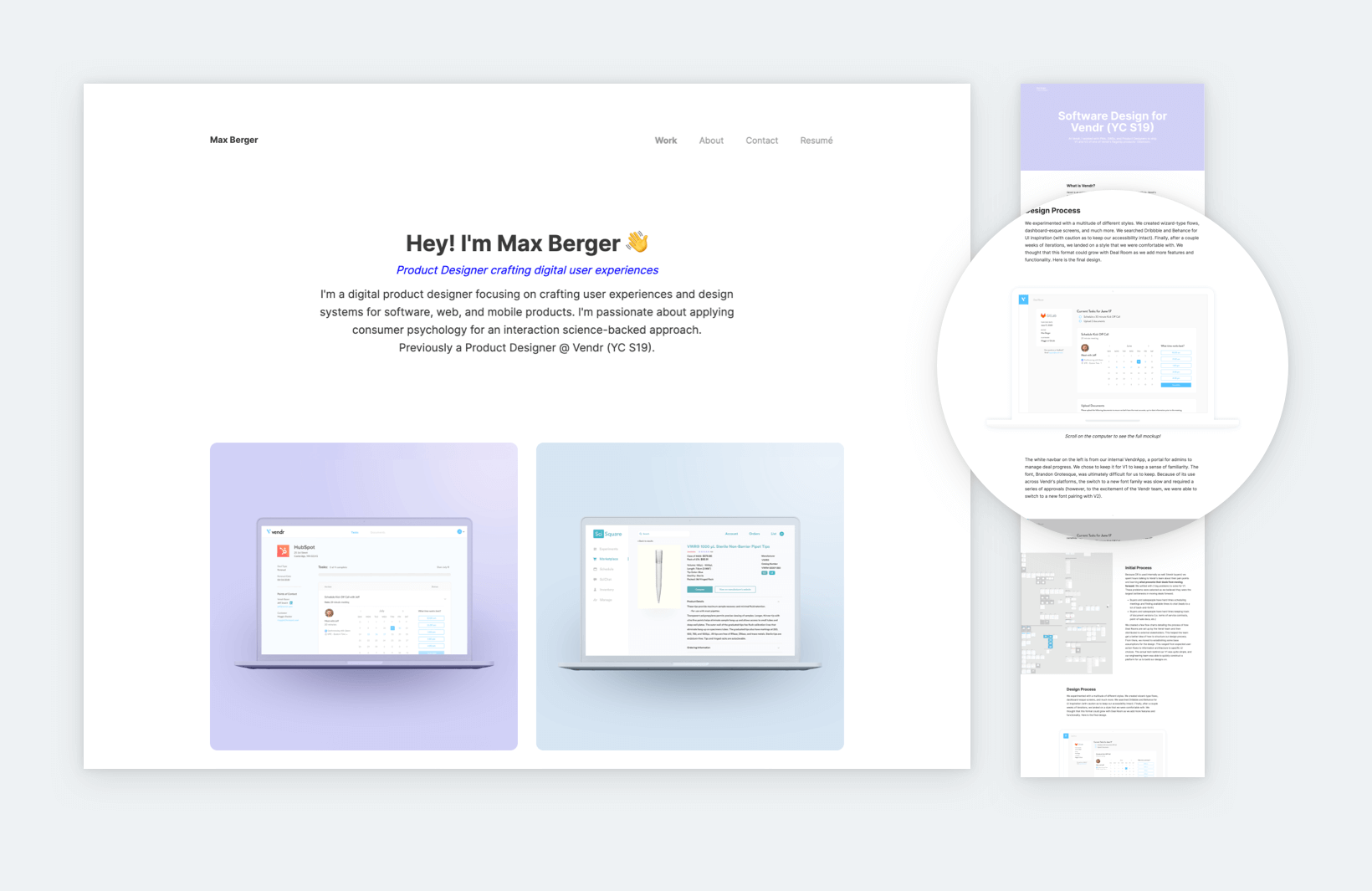
4. Questions about inspiration and motivation
We can all agree that UX education does not end after you leave a UX bootcamp. The best designers are always aware – and ahead – of new trends and innovations related to their profession. Continuous and conscious self-improvement is important in all fields.
Before a UX designer interview, collect your thoughts about ways you are improving yourself on the regular. It can be reading, practicing design, listening to podcasts, or basically anything that is related to your work. Just make sure that you can give concrete examples if you’re asked to.
Also, think of some apps that you love and use on a daily basis. Besides your portfolio, this is the best way to showcase your personal taste.
Questions:
- Where do you go for UX design inspiration?
- What are your favourite apps or websites and why?
- Can you name any design leaders that you follow?
- Who are your design heroes?
- What UX related publications do you read?
- Do you have a product idea you want to build in the future?
👉 Pro tip: If you are not following any design leaders or publications, you should start as soon as possible. Also, it does not hurt to memorize their names. That is because knowing where to go for inspiration on days when it doesn’t come naturally is extremely important.
5. Product management and collaboration-related questions
Most companies are well aware of potential disagreements between UXers and PMs. This is usually a sensitive topic. First of all, you should never talk negatively about any PM you have been working with in the past. Being a problem solver, who handles tension with a cold head is the best look you can present.
If you are applying for a junior position, you should expect these questions in a way more general tone, something along the lines of the evergreen “Do you consider yourself a team player?”
Questions:
- What is your process for collaborating with other team members, such as researchers, Product Managers, or developers?
- What do you do if you disagree with a product manager or teammate?
- Tell us about a challenging project and the ways you have handled the emerging problems?
- What is your process of handing over designs to developers?
👉 Pro tip: You can be sure that senior UX designer interview questions will include some about Product Managers so make sure to collect your thoughts and experiences. Try to give detailed answers based on real-life experiences and refrain from badmouthing anyone.
6. Skill-related and technical UX interview questions
Most companies have their preferred design software. This doesn’t mean that there is no room for anything else, but being familiar with those (or similar) software will be an advantage. Still, you should not lie about your technical skills, as you never know what your first day/week/month in the position has in the bag.
Another important topic is evaluation. We at UXfolio are always stressing the importance of including numbers in case studies. There is nothing more convincing than analytical data showcasing the impact of your work. Adding charts, numbers, and tables to your case studies prove the change you’re capable of making.
Questions:
- How would you conduct the UX evaluation of a product?
- Based on what analytical tools, data, and KPIs have you evaluated your previous designs?
- What are the major differences between designing for web and mobile?
- What tools do you use for prototyping?
👉 Pro tip: If you don’t have any analytical data to showcase, make sure to have some answers prepared for UX designer interview questions about analytics and evaluation. Make a list of tools and methods that you would implement to measure the impact of your work.
7. Your knowledge about the company and product
Nowadays most companies are realizing the importance and positive effects of embracing their unique history and culture. Therefore, you should be prepared to answer questions about the company that you are applying to. This part depends solely on research.
With each interview that you attend, you should tune your answer to the company. The culture and tone of a startup will be very different from a legacy brand.
Questions:
- Why do you want to work here?
- What made you interested in this position?
- What do you like about our product/company?
- What improvements would you make to the UX of our product/s?
👉 Pro tip: Read the company’s official blog, their About Us, and FAQ. Also, check out their social media to see how they interact with their followers to gather a general idea about the company culture. Not all legacy companies use a serious tone, for example.
Before you go
Do not forget that all interviewers have their own personal interviewing style and preferred questions. Thus, it is impossible to predict exactly which questions will get asked. Still, writing up the answers to as many questions as possible will help you collect your thoughts on your career and skills. With all the bases covered, it will be easier to give educated answers to almost anything UX design and career-related.
👉 Pro tip: Before you jump into it, educate yourself about the requirements of the market. You can do that by checking out the UX designer job descriptions of top companies, such as Google and Apple.
Answer UX designer interview questions through your portfolio
Never attend a job interview without a UX portfolio! Even if the company is not asking you to bring your portfolio, you should have it prepared. As you have seen with some of the UX designer interview questions above, examples are the best at proving a point.
If you want to stay organized, bring your computer or laptop to the interview and show your work through your digital portfolio. This way, you can be sure about narrating the process with precision. UXfolio’s case study templates will help you to showcase your design process in the best way. Answering the guiding questions and using our text examples will also help you to prepare for the interview.
Start building your portfolio easily, without coding, with UXfolio!
